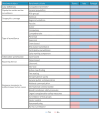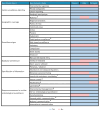Description and comparison of national surveillance systems and response measures for Aedes-borne diseases in France, Italy and Portugal: a benchmarking study, 2023
- PMID: 40248888
- PMCID: PMC12007401
- DOI: 10.2807/1560-7917.ES.2025.30.15.2400515
Description and comparison of national surveillance systems and response measures for Aedes-borne diseases in France, Italy and Portugal: a benchmarking study, 2023
Abstract
BackgroundRegions of southern Europe are increasingly colonised by Aedes albopictus, with incidence of autochthonous dengue cases rising in recent years.AimWe describe and compare Aedes-borne disease (dengue, chikungunya and Zika) incidence from 2017 to 2023, and the surveillance systems and response measures operating in France, Italy and Portugal in 2023, to improve surveillance, prevention, preparedness and response in Europe.MethodsWe performed a benchmarking analysis to systematically capture the systems used in each country. We collected data from key-informant interviews, national guidelines, reports and scientific literature using a standardised questionnaire adapted from the European Centre for Disease Prevention and Control framework.ResultsAll three countries have an integrated surveillance system for Aedes-borne diseases and share similarities in surveillance type, geographic coverage and case definitions. Differences entail mainly event-based and active surveillance activities. Geographic coverage of vector surveillance is national in France and Portugal but regional in Italy. In response to autochthonous transmission, all countries implement/foresee active case-finding and blood safety protocols, while France and Italy strongly rely on vector control. Upon vector detection in non-colonised areas, the three countries implement ad hoc entomological surveillance and vector control.ConclusionsSurveillance systems and response measures in France, Italy and Portugal are broadly similar, with variations reflecting differences in healthcare system organisation (centralised in Portugal and France, regionalised in Italy), Ae. albopictus distribution and local transmission of Aedes-borne diseases. Risk-based surveillance, considering the national and cross-border epidemiological and entomological situations, can strengthen preparedness and early warning for Aedes-borne diseases in Europe.
Keywords: Aedes-borne disease; Cross-border; arboviruses; emerging infectious disease; preparedness; surveillance.
Conflict of interest statement
Figures


References
-
- European Centre for Disease Prevention and Control (ECDC). Increasing risk of mosquito-borne diseases in EU/EEA following spread of Aedes species. Stockholm: ECDC; 2023. Available from: https://www.ecdc.europa.eu/en/news-events/increasing-risk-mosquito-borne...
-
- Colón-González FJ, Sewe MO, Tompkins AM, Sjödin H, Casallas A, Rocklöv J, et al. Projecting the risk of mosquito-borne diseases in a warmer and more populated world: a multi-model, multi-scenario intercomparison modelling study. Lancet Planet Health. 2021;5(7):e404-14. 10.1016/S2542-5196(21)00132-7 - DOI - PMC - PubMed
-
- Heymann DL. Control of Communicable Diseases Manual. Washington DC: American Public Health Association; 2022.
-
- World Health Organization (WHO). Global vector control response 2017-2030. Geneva: WHO; 2017. Available from: https://www.who.int/publications/i/item/9789241512978
Publication types
MeSH terms
LinkOut - more resources
Full Text Sources
Medical
